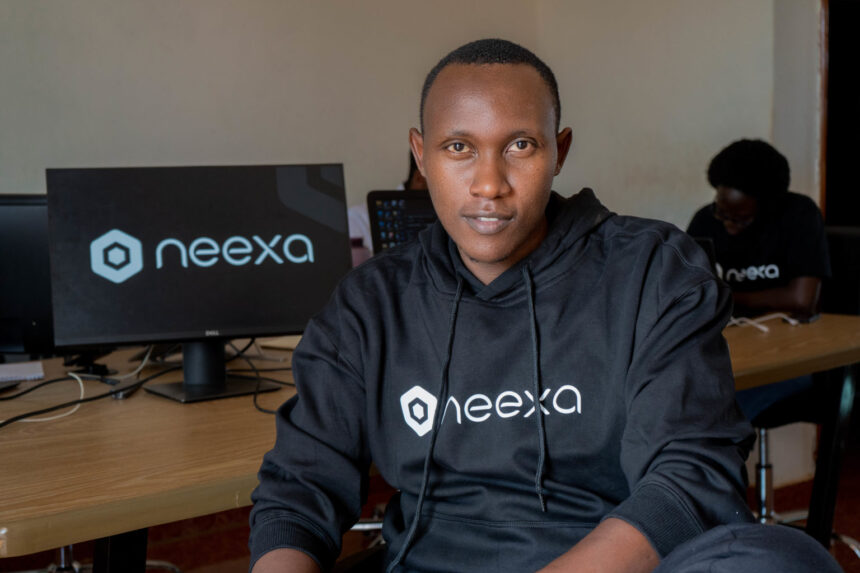When Ethan Bampeire founded Neexa AI, his vision was to help Ugandan businesses win more customers using an AI-powered sales agent that works around the clock.
But for him, building such a solution in Uganda is not just about technology. It’s a test of resilience in a market where venture capital is scarce, tech talent is draining abroad, and customer adoption is slow.
According to him, Uganda has no shortage of hackathons, incubators, or accelerators for young entrepreneurs. What it lacks, however, is money.
“Everyone wants to train you, accelerate you, but no one wants to invest in you,” says Ethan Bampeire, founder and CEO of Neexa AI. “And when they do, it’s usually very small cheques.”
What You Should Know
Bampeire’s startup, Neexa AI, is developing an AI-powered sales agent designed to help African businesses engage prospects, nurture leads, and convert them into paying customers around the clock.
But in a country that drew only an estimated $18 million in venture funding in 2024, building a tech business depends less on cutting-edge software than on resilience and improvisation.
Bampeire says he first experienced Uganda’s funding gap when he raised his initial cheque, just $1,000 from a local incubator. The support was valuable, but financially negligible.
“It was not hard, almost at all,” he recalls. “But it was also minimal, so as you’d imagine, its impact wasn’t felt enough. The support from the incubator was valuable, but money-wise, it didn’t move the needle.”
Observers say that experience mirrors the trajectory of many Ugandan founders. While donor-funded accelerators and innovation hubs in Kampala offer training, they rarely back it up with substantial funding.
Bampeire believes this leaves founders trapped in a cycle of pitch competitions and mentorship sessions that are more ceremonial than catalytic. International investors, he says, approach Uganda with caution.
“They see virgin territory that’s yet to be understood, so they’re trading extra carefully. That’s pushed us to focus more on local investors.”
About Neexa
Neexa is an autonomous Sales AI built for B2C businesses such as schools and manufacturers selling directly to consumers. Bampeire told Techparley that the AI responds the moment a customer sends a message, engaging them meaningfully, following up consistently, and staying with them in real time.
According to the startup, getting started is quick and easy. In less than 15 minutes, you can train Neexa by sharing notes, documents, or your website link so it understands your business, products, and services.
Once ready, Neexa integrates effortlessly with your favorite platforms, including your website, WhatsApp, and social media, allowing it to meet customers where they already are.
From there, Neexa handles the heavy lifting: chatting with prospects, following up on leads, and closing sales around the clock. The team added that you can track every interaction in your Neexa dashboard, review analytics, and even step in with human takeover when needed.
Understanding the Lessons Learned
According to the International Finance Corporation (IFC), fewer than 5% of Ugandan SMEs have ever accessed equity finance, a stark contrast with Nairobi, where angel investors and syndicates are increasingly visible.
For Neexa AI, the challenge lies in showing SMEs that artificial intelligence is not just a buzzword, but a practical way to automate repetitive tasks and improve sales pipelines. The most important lesson, Bampeire says, has been speed.
“Moving fast is a feature in a startup,” he says. “Ship fast, test the market, refine fast, repeat. Make the pivot as soon as you prove your assumptions.”
“You need to validate that you’re solving a real problem. It’s so easy to think you are, but until the market proves it, you’re just guessing.”
According to industry leaders, Uganda’s startup ecosystem may lack the capital and investor appetite of Nairobi or Lagos, but its founders are finding ways to adapt.
Startups like Neexa AI are learning to survive by focusing on traction, moving fast, and proving real customer value rather than relying on big cheques. Analysts say this resilience-driven approach is shaping the identity of Uganda’s tech scene.
Talking Points
It is remarkable that Neexa AI is attempting to solve one of the biggest bottlenecks for Ugandan businesses: customer acquisition. By automating outreach, follow-ups, and sales through an AI-powered agent, Neexa directly addresses the challenge of limited sales capacity faced by many SMEs.
This functionality positions Neexa as a practical solution in a market where businesses often lack the manpower and resources to consistently engage prospects. For time-constrained entrepreneurs, the promise of “sales on autopilot” could be transformative.
At Techparley, we see how tools like Neexa can help bridge the gap between Uganda’s vibrant entrepreneurial energy and the structural barriers holding it back, namely scarce funding, limited talent, and slow customer adoption of digital solutions.
Looking ahead, partnerships with banks, telcos, and trade associations could accelerate adoption beyond early tech-savvy businesses. In the long run, Neexa has the potential not only to scale but also to showcase how Ugandan startups can build practical, homegrown innovations in tough markets.





